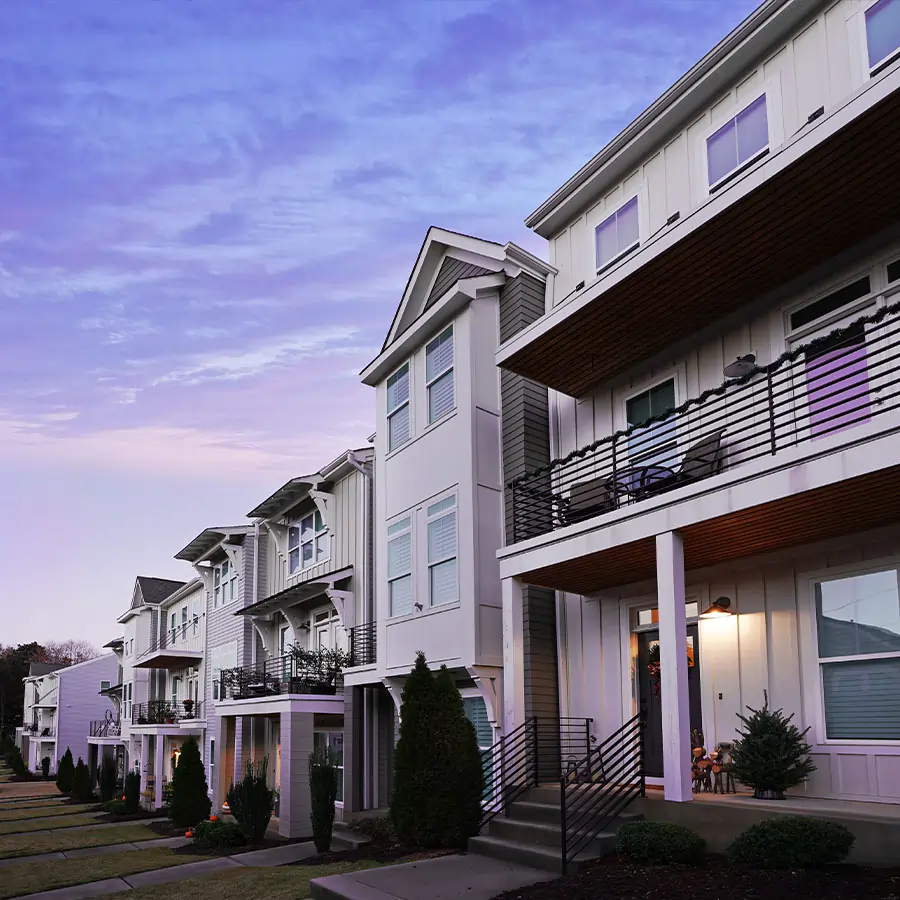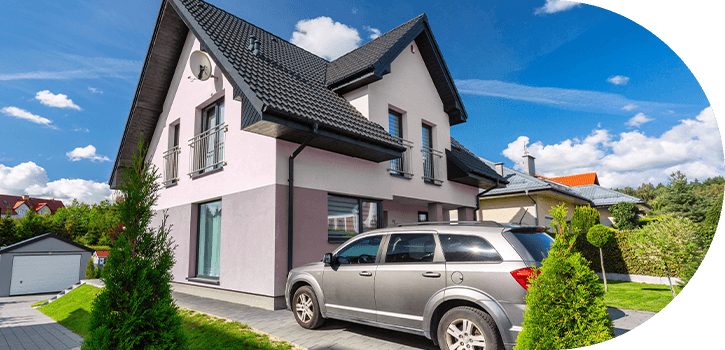
Home insurance for every kind of home in Ontario
Homeowners insurance is the best way to protect your investment. Whether you live in a modern home, townhouse, semi-detached or bungalow, we’ve got you covered from the shingles to the hardwood floors and everything in between. Get coverage for damage to your home and its contents from fire, flood and more. Talk to one of our home insurance brokers today.




How much does home insurance cost?
Unlike condo or tenant insurance, homeowners insurance covers the building itself which is why it’s generally more expensive. Depending on where you live, the type of home and whether you choose optional coverages, homeowners insurance can cost between $800 and $2,500 a year. Our insurance brokers will help you determine the coverage you need; at a rate you’ll love.

What does homeowners insurance cover?
In Ontario, homeowners insurance protects your home, your belongings, as well as accidents and injuries on your property. Here’s a closer look at what’s included with basic coverage:
The buildings
Includes coverage for your foundation, walls, roof and the structure of your house from damage caused by fire, storms, vandalism and more.
More about dwelling coverage
Minor property damage
If you are responsible for minor damage to someone’s property, this coverage pays for the damage without going to court.
More about voluntary property damage coverage
Your belongings
Your personal belongings, like electronics, furniture and clothing, are covered for theft, water or fire damage, even when they’re not in the home.
More about contents coverage
Living expenses
Expenses like alternate accommodations and meals can be covered if you have to temporarily live somewhere else after a claim because of damage to your home.
More about additional living expenses coverage
Liability
If someone is accidentally hurt on your property or their belongings are damaged, your home insurance will pay for the damages caused.
More about personal liability coverage
Medical expenses
Covers minor medical costs if someone hurts themselves on your property, whether you’re liable or not. It helps avoid hassles associated with lengthy liability claims.
More about voluntary medical payments coverage
Detached structures
Any structure on your property not connected to your home, like a detached garage, shed or gazebo, is covered for fire, storm damage and more.
More about additional buildings
Other coverage options to consider
Even a comprehensive homeowners policy doesn’t cover everything. Certain things can be covered by adding an endorsement to your policy. Some of the most common endorsements we recommend are:
Sewer backup
It happens more often than you think, but sewer backup isn’t covered under homeowners insurance unless you specifically add it.
More about sewer backup coverage
Overland water
If a river overflows and your basement floods, it’s only covered if you have overland water protection. This can be difficult to get in some areas.
More about overland flood coverage
Groundwater
Groundwater coverage protects your home if water seeps in through cracks in your foundation. Not all companies offer it, but it’s worth considering if available.
More about groundwater coverage
Earthquake
This coverage is more expensive in areas known for seismic activity. Deductibles can be high, but it might make sense for you.
More about earthquake coverage

Save on home insurance with bundle discounts
Combine your home and auto coverage to save up to $600 on insurance. As an outlet for over 70 of Canada’s top insurance companies, we have access to some of the best coverage and rates in Ontario. You’ll never have to shop and compare again, we’ll do the work for you.


Frequently asked questions about homeowners insurance
What’s not covered under homeowners insurance?
All home insurance has exclusions or types of damage that are not covered. Some common exclusions include:
- Losses due to war or terrorism
- Losses when the home is vacant for more than 30 days
- Losses caused on purpose by the homeowner (arson or fraud)
- Losses caused by insects or animals
- Losses while you’re doing renovations or construction
Some other types of loss are generally excluded but can be covered by purchasing an endorsement or a separate policy, for example:
- Builder’s risk insurance covers your home while it’s under renovations
- A sewer backup endorsement adds coverage that’s usually excluded if your plumbing backs up.
- Overland flooding and groundwater endorsements cover other types of water infiltration that are usually excluded
- Earthquake damage is not ordinarily covered, but you can add it through an endorsement.
Learn more about home insurance exclusions.
Why is the rebuild value of my home different from what I paid?
What you paid for your home, and how much it would cost to rebuild it after something like a fire, are different in terms of price and value. What someone is willing to pay for a home drives the selling price and value, whereas the cost of materials, labour and compliance with building regulations impacts the price to rebuild your home after a claim. Your insurance coverage is based on how much it would cost to rebuild your home, not how much your home would sell for.
What coverage does my bank require for my mortgage?
Most banks and financial institutions prefer that your home is covered by a comprehensive homeowners policy. This coverage protects your home against most kinds of loss or damage. While a comprehensive homeowners policy doesn’t cover every possible type of loss, it certainly covers those that are most likely to happen. It’s also common for banks to ask if you have Guaranteed Replacement Cost coverage. This inexpensive, optional coverage will pay out whatever amount is required to completely rebuild after a major claim – regardless if the cost is higher than the limit shown on your policy documents. Guaranteed Replacement Cost also includes costs for removing debris from your existing home. This is a great coverage to have, as the cost of removing wreckage and constructing a new home from scratch can often be difficult to estimate given the number of variables. Guaranteed Replacement Cost gives you and your bank total peace of mind. We can help you determine if this endorsement is available for your home.
When do you need home insurance?
Unlike auto insurance, home insurance is not a mandatory coverage in Ontario. On the other hand, it’s usually required for a mortgage. Before a bank or financial institution lends you money to buy a home, they’ll want to make sure that your mutual investment is protected through a homeowners insurance policy.
When a mortgage is paid off, insurance is no longer needed from the bank’s point of view. But even if you’re mortgage-free, you’ll probably still want homeowners insurance to protect one of the largest financial investments of your life.
How much does homeowners insurance cost?
Depending on the specifics of your home’s construction, the area of Ontario that you live in and your insurance history the cost of insurance can vary greatly. While most Canadians pay between $1,000-$2,500 a year, some policies can be much more. This amount differs from home to home.
Are there discounts for home insurance?
Yes! There are lots of discounts that you might be able to take advantage of depending on what insurance company you’re with:
- Home and auto bundle discount – For having your home and auto insurance with the same company
- Non-smoker discount – If you and your family are non-smokers (that includes cannabis and vapes)
- Mortgage-free discount – Pretty self-explanatory
- Home security discount – If you have a monitored home alarm system
- Mature homeowner discount – If you’re over a certain age, usually 55
- New home discount – If your home is below a certain age
Does homeowners insurance cover cyber theft?
Basic homeowners insurance will not include cyber theft. You may be able to purchase an endorsement or a rider to include cyber protection. Some insurers will also offer identity theft coverage, which is usually only $15-$25 extra to add and offers protection for the costs associated with reversing/recovering from fraud. Household cyber liability insurance goes a few steps further and may cost $25-$60 a year to add.
Does homeowners insurance cover things that condo or tenants insurance doesn’t?
Absolutely it does. The key difference is that homeowners insurance protects the physical building itself (the dwelling) as well as other structures on your property like a fence, detached garage, pool, sheds etc. Tenants insurance only covers liability and a certain amount for your contents or possessions. Condo coverage, on the other hand, does include some protection for parts of the condo unit that aren’t covered under the condo corporation’s policy, but it’s nowhere near the amount of coverage for physical damage under a homeowners policy.
Being an outlet for over 70 of Canada’s top insurers means we have access to a wide range of insurance solutions at some of the best rates in Ontario. Want to learn more about the coverage options available to you? Here’s a few of them.









